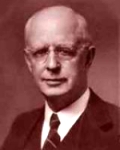|
MAJOR BIBLE THEMES
By Dr.
Louis Sperry Chafer
|
"Bible doctrines are the bones of
revelation and the attentive Bible student must be
impressed with the New Testament emphasis on sound
doctrine (Matt. 7:28; John 7:16, 17; Acts 2:42; Rom.
6:17; Eph. 4:14; 1 Tim. 1:3; 4:6, 16; 6:1; 2 Tim.
3:10, 16; 4:2, 3; 2 John 1:9, 10)."
~ Dr. Louis Sperry Chafer ~ |
The studies presented
herein are a continuation
of Major Bible Themes which, Lord willing, will
eventually be presented
in its entirety. Major Bible Themes may serve as a wonderful outline for personal or group
Bible study.
Links to previous studies in the series may be found in our
Library
and
Sound Doctrine
pages. ~ editor
CHAPTER XXIII:
MAN: HIS CREATION
|
"It
is natural that man should seek to understand his
own origin." |
Discovering
himself in the midst of a wonderful universe and being the
highest order of its visible creatures, it is natural that
man should seek to understand his own origin as well as the
origin of all existing things; yet man, unaided, can
discover nothing as to his origin. It is therefore
reasonable to expect that God would reveal these facts to
man. This He has done in the Bible. However, since God is
revealed and becomes real only to those who are saved
through Christ (Matt. 11:27-29), men who are not saved and
to whom God is not real have turned from the Scripture
records of the origin of all things, and have sought to
account for existing things on the basis of supposed laws of
evolution. According to these human theories, there was
originally a primordial cell from which has evolved every
existing form of life whether it be whale or hummingbird,
elephant or mosquito, man or tadpole. Over against these
theories are the clear teachings of the Scriptures, wherein
it is not only directly stated (Gen. 1:1 to 2:25; Col. 1:16;
Heb. 11:3), but it is everywhere implied, that every living
thing was created by the immediate power and will of God.
As to their theories concerning the origin of things, men
are thus divided into two general classes. It is not a
division between learned and unlearned men, or between good
and bad men; but it is a division between men to whom God is
sufficiently real and those to whom He is not sufficiently
real to be accepted as the Creator of all things. There is
an unalterable law which accounts for the capacity or
incapacity of man to grasp the things of God (1 Cor. 2:12,
14; John 3:3). By faith we
understand (Heb. 11:3); but the man without faith
does not understand, nor can he ever understand until he is
saved in Christ. And since the unregenerate cannot
understand, God has commissioned the Gospel to be preached
to them rather than a ministry of useless controversy.
According to the testimony of the Scriptures (which
testimony every Christian will receive, since he is indwelt
by the same Spirit who wrote the Scriptures -- 1 Cor. 2:12),
man, in his present human form, was created by God as the
conclusion and consummation of all creation. Of man it is
said that he was made in the image and likeness of God (Gen.
1:26), and that God breathed into him the breath of life
(Gen. 2:7). These distinctions classify man above all other
forms of life which are upon the earth.
Speaking generally, man's creation included that which was
material -- the dust
(symbolizing the use of elements appropriate to the forming
of a material body), and immaterial --
the breath of life. This general two-fold
distinction is elsewhere indicated as the
outward man and the
inward man (2 Cor.
4:16); the earthen vessel
and this treasure (2
Cor. 4:7). Likewise, contemplating the soul or spirit as
representing that which is immaterial in man, we read that
the dust returns to the earth as it was, and the spirit . .
. unto God who gave it (Eccles. 12:7); and there
are those who are able to kill the
body who are not able to
kill the soul (Matt. 10:28). It was when God
breathed . . . the breath of life
into the material body that man became a
living soul (Gen. 2:7;
note, also, 2 Cor. 5:8; 3 John 1:2).
1. When considering the immaterial part of man, it should be
observed that the Scriptures, while sometimes using the
terms interchangeably (Comp. Gen. 41:8 with Psa. 42:6; John
12:27 with 13:21; Matt. 20:28 with 27:50; Heb. 12:23 with
Rev. 6:9), even applying these terms to God on the one hand
(Isa. 42:1; Jer. 9:9; Heb. 10:38), and to the brute creation
on the other hand (Eccles. 3:21; Rev. 16:3), do distinguish
between the spirit and the soul of man (1 Thess. 5:23; Heb.
4:12). Though the highest functions of the immaterial part
of man are sometimes attributed to the spirit and sometimes
to the soul (Mark 8:36, 37; 12:30; Luke 1:46; Heb. 6:18, 19;
Jas. 1:21), the spirit is usually mentioned in the
Scriptures as that part of man which is capable of
contemplating God, and the soul as that part of man which is
related to self and the various functions of the intellect,
sensibilities and will.
There are three main theories as to the origin of the soul
and spirit:
(1) The Pre-existence theory, which contends that the soul
and spirit of man have existed eternally, and is only
incarnated in the body at the beginning of the human
existence. This doctrine is not held by evangelical bodies.
(2) The Creation theory, which contends that the soul and
spirit of man are directly and individually created by God
at the beginning of human existence. This theory, though
held by some evangelical Christians, fails, since by it the
body alone is supposed to be propagated, and therefore is
solely responsible for the continuance of the effect of the
Fall.
(3) The Traducian theory, which contends that the soul and
spirit, like the body, were potentially created in Adam, and
are alike propagated by the natural laws of generation. This
theory is Biblical. God is said to have breathed only once
into man the breath of life, and after this He ceased
creation (Gen. 2:2). Thus, and only thus, the fall of man,
which so evidently affects the soul and spirit, is
transmitted from generation to generation.
2. When considering the Scripture teaching regarding the
material part of man, we note certain facts:
(1) The terms "the body" and "the flesh" are not synonymous.
The body is only the house of the soul, while the flesh (when
that term is used in its ethical sense) includes spirit,
soul, and body -- or all that composes the unregenerate man.
(2) The body of the saved one is especially considered (2
Cor. 5:6, 8; 12:2, 3; Jas. 2:26). It is a
temple (1 Cor. 6:19;
John 2:21; Phil. 1:20), an earthen
vessel (2 Cor. 4:7), a body of limitations (Phil.
2:21), to be mortified (Rom. 8:13; Col. 3:5), it was buffeted
by Paul (1 Cor. 9:27), and it is to be changed at the return
of Christ (1 Cor. 15:51-53). The body, as well as the soul
or spirit, is to be sanctified, saved, redeemed, and finally
glorified forever (Luke 24:39; Rom. 8:13; 1 Cor. 6:13-20;
Phil. 3:20, 21). This mortal shall put on immortality, and
this corruptible shall put on incorruption.
(3) Mention is also made of Christ's physical body, which
was broken for us, and
His spiritual body, which is the Church.
QUESTIONS
1. Is unaided man able to discover anything
concerning the origin of things?
2.
a. Not knowing God nor being able to make Him real, what is the
best solution of the origin of things that the unregenerate have
proposed?
b. What is the teaching of the Scriptures with regard to the
origin of all things?
c. If it is not a question of human learning, on what principle
are men divided?
3.
a. Where in the order of creation did man appear?
b. Into what image and likeness was he created?
4.
a. What is the general two-fold distinction concerning man?
b. Indicate the contrasts between these factors as set forth in
the Scriptures.
5.
a. What Scriptures distinguish between the soul and spirit in
man?
b. Does it follow that soul and spirit are identical because
sometimes used interchangeably for the immaterial part of man?
c. What may be said of the soul and what of the spirit of man?
6.
a. Name the three theories as to the origin of the soul and
spirit.
b. Which of these theories is Biblical?
7. Distinguish between the body and the flesh as used in the
Scriptures.
8. What is said in the Scriptures regarding the body of the
Christian?
9. What great change is promised this body?
10. What is the meaning of mortal and immortal?
11. What is the meaning of corruptible and incorruptible?
12. Name two uses of the word body as belonging to Christ.
13. For whom was His physical body broken?
14. What do you understand to be the spiritual body of Christ
(see Eph. 1:22, 23)?
|
Major Bible
Themes herein presented is its first edition
(copyright 1926), is in the public domain, and may be
freely downloaded in its entirety or chapter by chapter
at
http://www.spiritual-research-network.com/major-bible-themes.html.
Information for purchase
of the revised edition by John F. Walvoord (copyright
1974) may be found at the same address.
Dr. Louis Sperry Chafer (1871-1952)
was the founder of Dallas Theological Seminary, and from
1924 until his death, served as the its first President
and Professor of Systematic Theology. His
ground-breaking eight volume Systematic Theology,
first published in 1947-1948,
was the first systematization of a premillennial,
dispensational interpretation of the Scriptures.
|
Return to Home Page

|



